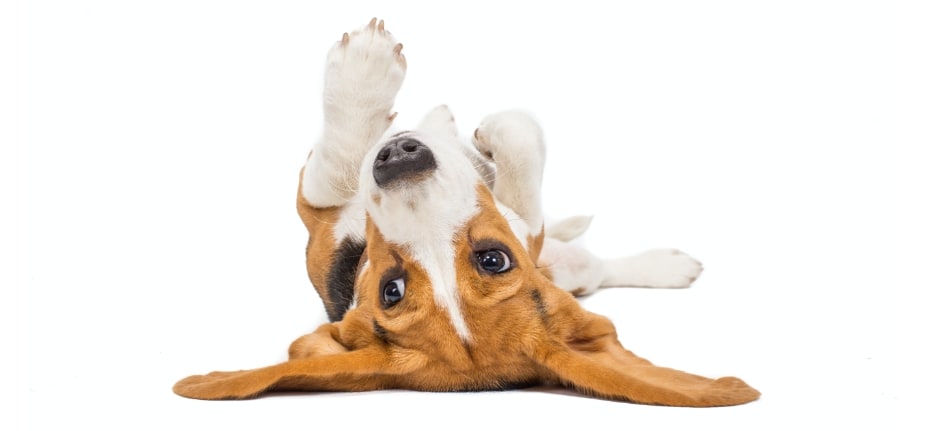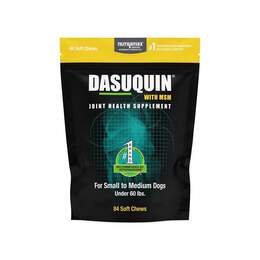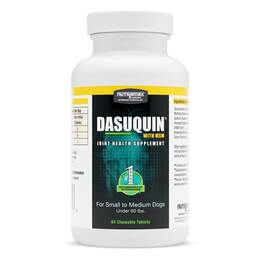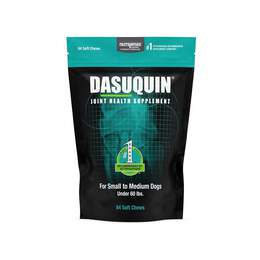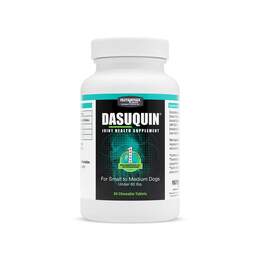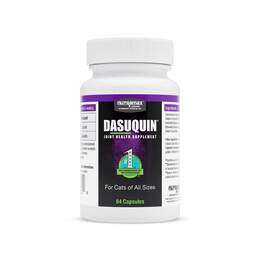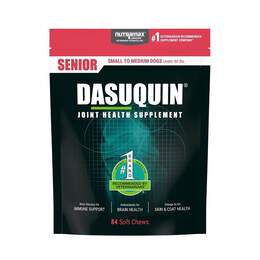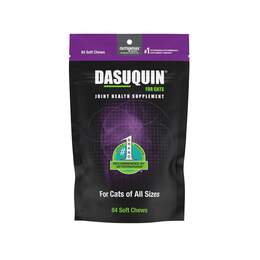Dasuquin
If you notice your dog or cat not moving as well as they used to, maybe getting up or lying down more slowly, and they just don't seem to have as much energy as they used to, they may be suffering from joint pain and stiffness. As your dog or cat gets older, paying attention to their movements and energy level is essential.
When an older pet's energy and activity level seems lacking, they show stiffness when they move or don't seem to want to walk or play, they may have developed arthritis or some other joint disease. Common signs of joint pain in dogs include:
- Favoring a leg or limping
- Trouble getting up lying down
- Lowered activity level, tiring more easily
- Stiff movements and noticeable soreness in the joints
- Hesitancy when climbing stairs, running, jumping, or playing
Common signs of joint pain in cats include:
- Inability or reluctance to jump up or down from the furniture
- General reluctance to move
- Increased irritability when touched or handled
- Stiffness
- Reluctance to sharpen claws
- Reluctance to groom
- Difficulty getting into or out of the litter box
Not every sign is seen in every dog or cat. If you begin to notice any in your pet, schedule an appointment with your veterinarian.
Several factors contribute to joint disease in pets, including activity level, breed, and age, although even young pets, especially cats, can experience joint issues. If your dog or cat shows less or no interest in playing, walking, or any of their regular activities, shows signs of pain, and seems to be slowing down, talk to your veterinarian. When joint issues are diagnosed early, your veterinarian can suggest a pain reliever or supplement to reduce their symptoms and improve their quality of life.
What Is Dasuquin?
Dasuquin is a comprehensive supplement that supports and promotes joint health in dogs and cats. It is designed to improve joint function and mobility, enhance cartilage and tissue repair, and reduce cartilage breakdown. It can reduce the pain or discomfort and improve the mobility of aging dogs and cats.
The supplement contains chondroitin, glucosamine, and avocado/soybean powder for optimal joint nutrition and health. Dasuquin for dogs is available in flavored soft chews and chewable tablets; it is an available capsule that can be opened and mixed with food for cats.
Dasuquin's active ingredients include avocado/soybean unsaponifiables (ASU), chemicals found in avocado and soybean oils. ASU helps improve joint function, protects cartilage, and can reduce swelling in the joints. They also help increase the effectiveness of glucosamine and chondroitin. The synergistic mix of these three active ingredients blocks the enzymes that break down cartilage and support cartilage production.
Most of us are familiar with glucosamine, some of us may even take it as a supplement. It is a natural compound found in healthy cartilage in pets and humans. It increases the production of molecules that bind water in the cartilage, a process that helps hydrate joints and keep them healthy. Healthy cartilage cushions the joints and protects them from everyday wear and tear.
Benefits of Dasuquin for Dogs and Cats
- Supports joint health
- Protects cartilage
- Helps pets enjoy a healthy, active lifestyle
- Improves quality of life for pets
- No adverse side effects
Dasuquin for Cats
Designed specifically for cats, Dasuquin capsules can improve joint health in cats of all ages. It may help reverse or slow down the process of cartilage breakdown.
Dasuquin for Dogs
This tasty, chewable tablet supports joint health and improves joint function. It also protects cartilage, stimulates cartilage production, and inhibits cartilage breakdown. It is a convenient and easy to administer way to improve your dog's joint health.
Dasuquin Soft Chews for Dogs
Designed to support your dog's joints and help maintain their mobility in soft chew form.
Dasuquin with MSM
Dasuquin with MSM for dogs combines ASU, chondroitin, and glucosamine with methylsulfonylmethane (MSM) and green tea extract. It provides sulfur, a nutrient that helps support cartilage.
Dasuquin with MSM Soft Chews
The same formula in a soft chew form.
Common Joint Diseases in Dogs and Cats
The majority of joint diseases in dogs and cats can't be cured, but they can be managed in a way that improves your pet's quality of life.
Osteoarthritis
Also called "degenerative joint disease," this condition occurs when the joint's cartilage begins to deteriorate. There are many causes for this, including genetics, repetitive stress, infection, injury, or the normal aging process. Losing this protective cushion leads to increased joint inflammation and pain.
Hip Dysplasia and Elbow Dysplasia (Rare in Cats)
Hip or elbow dysplasia happens most often in large and giant breed dogs, although it can occur in other breeds and rarely in cats. This is an abnormal formation of the hip or elbow joint. It can be caused by environmental factors (obesity, improper nutrition) or genetics.
Osteochondritis Dissecans (Large Breed Dogs)
Osteochondritis Dissecans (OCD) happens when young large-breed dogs grow too fast, and the cartilage around the joints becomes abnormally thick. This abnormally thick cartilage is weak and damages easily through normal activity. It then forms flaps and may detach from the bone. This causes lameness, inflammation, and pain.
Patellar Luxation (Rare in Cats)
Patellar luxation or dislocation of the kneecap occurs most often in small-breed dogs but can occur in large breeds and rarely in cats. In a mild case, the dog will skip or hop on three legs temporarily until the kneecap goes back into position. In a severe case, the dog may walk with their leg permanently flexed, and this can cause additional orthopedic issues down the line.
Dasuquin Side Effects and Contraindications
Dasuquin is considered safe for most dogs. In rare instances, some dogs may have an intolerance to the avocado in the formula that can cause mild stomach issues. There are no known adverse effects or safety concerns. In addition, there are no known contraindications or adverse interactions between other supplements or medications and Dasuquin. However, it is essential to contact your veterinarian before giving your dog or cat any new supplements or medication. If you notice diarrhea, vomiting, behavior changes, or allergic reaction after giving your pet Dasuquin, immediately contact your veterinarian.

